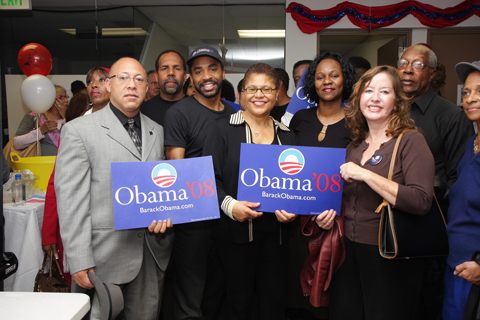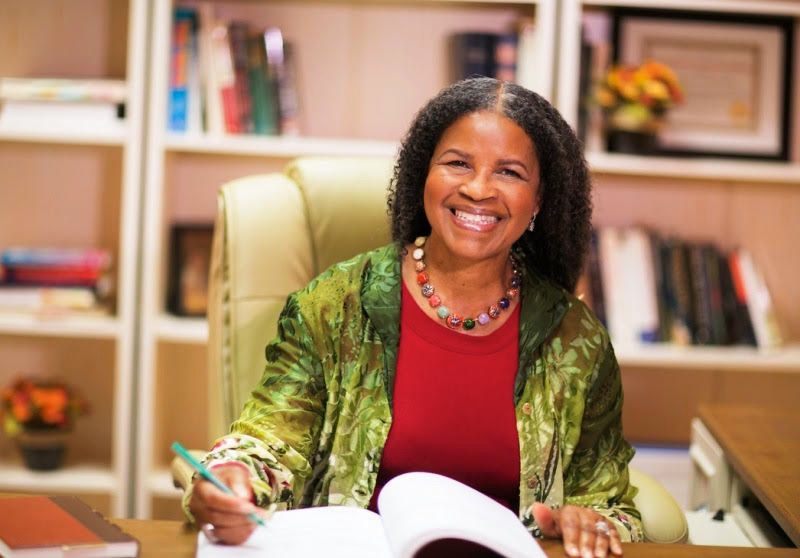 |
It has been over four decades since the Voting Rights Act of 1965 was passed allowing for Blacks to freely participate in the political process, but not until now has America witnessed a phenomenon of the likes of Barack Obama.
“I would hope that it would happen, but I never thought it would happen in my lifetime,” said 77-year old Lillian Mobley.
 Mobley is a long time Los Angeles community activist who has championed the causes of the poor Blacks for most of her life.
Mobley is a long time Los Angeles community activist who has championed the causes of the poor Blacks for most of her life.
“He’s got what it takes to become president of the United States—his whole demeanor, character, love for people and life, love for humanity. I like the quality of Obama, what he talks about, what he seems to live everyday. I don’t know him personally, but the way he comes across to me, he’s a man of integrity, decency. He has all the qualities that it takes to make a president.”
Like Mobley, this country is in the midst of witnessing what many felt they would never see in their lifetime—an African American becoming president of the United States.
Barack Obama, the junior Illinois senator whom doubters believe lacks the experience needed for the nation’s highest office, swept the first Democratic caucus in Iowa and went head-to-head with Senator Hillary Clinton during New Hampshire’s primary, two states with an overwhelming White population.
Although it may be too soon to determine which Democratic candidate will ultimately receive the 2008 bid for the presidency, some say that Obama’s successes thus far are quite telling.
“Iowa was a huge victory,” said Mitchell Schwartz, Obama’s campaign director for the state of California. “To win by eight points in such a highly competitive atmosphere was huge. …And, to win in an overwhelmingly White state means people are open to our candidacy.”
In Iowa, a state with a 95 percent White population and two percent Black, Obama beat out his opponents with 38 percent of the vote while John Edwards and Clinton trailed behind with 30 percent and 29 percent, respectively.
On the grounds during the caucus was Dr. David Washington who gave his hypothesis regarding the win. “I think we won in Iowa because of the first-time caucus goers. …When you hear of first-time caucus-goers you think of someone who has never voted before. But I put forth the hypothesis that a lot of these first-time caucus-goers were first time Democratic caucus-goers—people who were Republicans and are Independents that have never taken part in the Democratic caucus who came because they’re so inspired by this guy named Barack Obama and his message of hope and change that they wanted to be a part of all of this.”
Both Washington and Schwartz were hoping for another victory in New Hampshire, which also has an overwhelming White population of 97 percent and a small Black population of one percent. However, the scales tipped slightly more for Clinton. Their neck-and-neck race ended with Clinton holding 39 percent of the vote and Obama at 37 percent. The tight race showed that Obama’s message of change continues to resonate throughout the country.
Born to a Kenyan father and White mother, Obama spent his childhood in Hawaii and Indonesia struggling to find himself while under his mother’s watch (his parents divorced when he was two).
After high school, he moved to Los Angeles to attend Occidental College and then transferred to Columbia University. He then developed a career in social work in Chicago before attending Harvard Law School and becoming the first Black president of the prestigious Harvard Law Review.
In 1997, Obama was elected to the Illinois State Senate where he cut his political teeth for seven years before he burst on the national scene in 2004.
That year, he delivered his inspiring keynote address at the Democratic National Convention and in November, he became the fifth Black U.S. Senator in history and the third since Reconstruction ended.
The married father of two, Obama has never been shy about sharing his background and concern for family values, basing most of his election platform on his social work experience in Chicago.
After shying away from religion early in his life, he now attends Trinity United Church in Christ in Chicago. He credits his conversion to realizing the power African-Americans churches have had in encouraging social change.
His journey toward self-discovery along with his message of change and a hope for a better America have appealed to a broad audience and now that audience is being gathered to cast their votes for him.
With two states already decided, one caucus and three more primaries to go this month, and Super Duper Tuesday opening next month, Schwartz and the Obama campaigners are focused on the work ahead.
In California, which shares its primary date with 19 other states on February 5, efforts are well underway.
Assembly Member Majority Leader Karen Bass, who co-chairs the California African Americans for Obama Campaign with San Francisco District Attorney Kamala Harris, is holding regular conference calls with the Black media to keep the press informed. And Robert Cole, serving as director of African American outreach in California, is galvanizing a massive grassroots program that recruits precinct captains throughout the state in an effort to personally contact every registered member of the Democratic Party in California.
The next stop on the Democratic campaign trail is the Michigan primary, followed by the Nevada caucus, South Carolina primary and Florida primary. California’s primary is set for February 5, Super Duper Tuesday.
For more information regarding Obama for America, visit www.BarackObama.com.






